Pride in Health 2024: Abstract Book
October 24, 2024
Pride in Health Organizing Committee
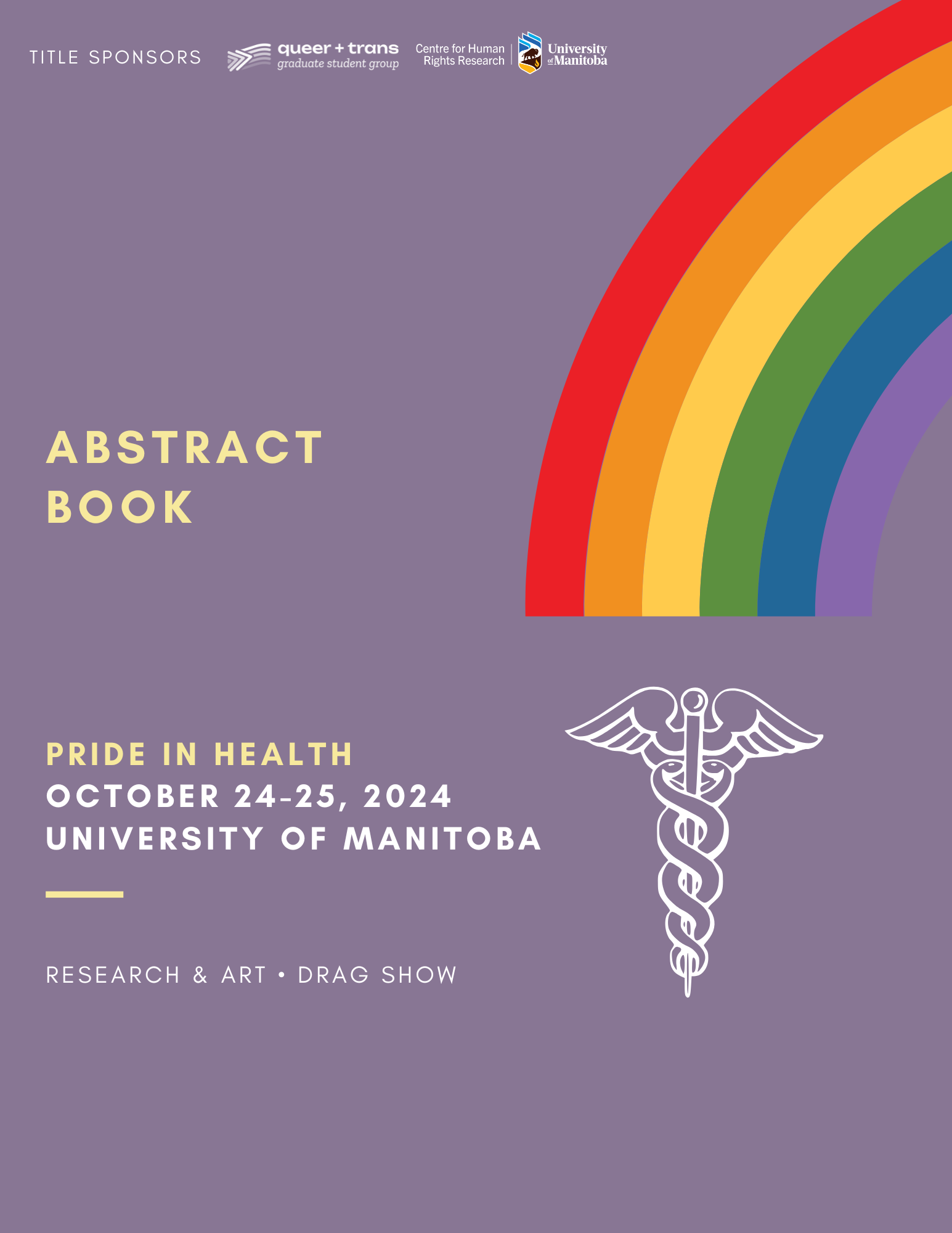
Pride in Health is an interdisciplinary research conference focused on the 2SLGBTQIA+ community. The conference was organized by the Queer & Trans Graduate Student Group and the Centre for Human Rights Research and held on October 24 and 25, 2024 in Winnipeg, Manitoba at the University of Manitoba.
The conference features work from students and early career researchers, on health, widely defined and highly inclusive, interpreted through the lenses of many different disciplines and includes oral presentations, scientific posters, and artwork.

A Resource Guide on Missing and Murdered Indigenous Women, Girls, Two-Spirit and Gender Diverse People in Canada
A Resource Guide on Missing and Murdered Indigenous Women, Girls, Two-Spirit and Gender Diverse People in Canada
October 15, 2024
Angela Ciceron

Trigger Warning: The content in this resource guide may be difficult and/or triggering. If you or someone you know needs emotional assistance related to this topic or the information in this article, help is available 24/7 through the MMIWG Support Line, 1-866-413-6649.
In May 2024, the Centre for Human Rights Research and Indigenous Engagement and Communications hosted Cambria Harris in honour of Red Dress Day. This resource guide was created to provide a starting point for people seeking to educate themselves about the issue of missing and murdered Indigenous women, girls, Two-Spirit, and gender diverse people (MMIWG2S+) in Canada. It also lists resources for those seeking help or resources in line with MMIWG2S+.
Related Resources
Support Us
Whether you are passionate about interdisciplinary human rights research, social justice programming, or student training and mentorship, the University of Manitoba offers opportunities to support the opportunities most important to you.
Doing the Work: What Settlers need to know about the Residential School System: Infographic
Doing the Work: What Settlers need to know about the Residential School System: Infographic
October 1, 2024
Laura Majendaagoz
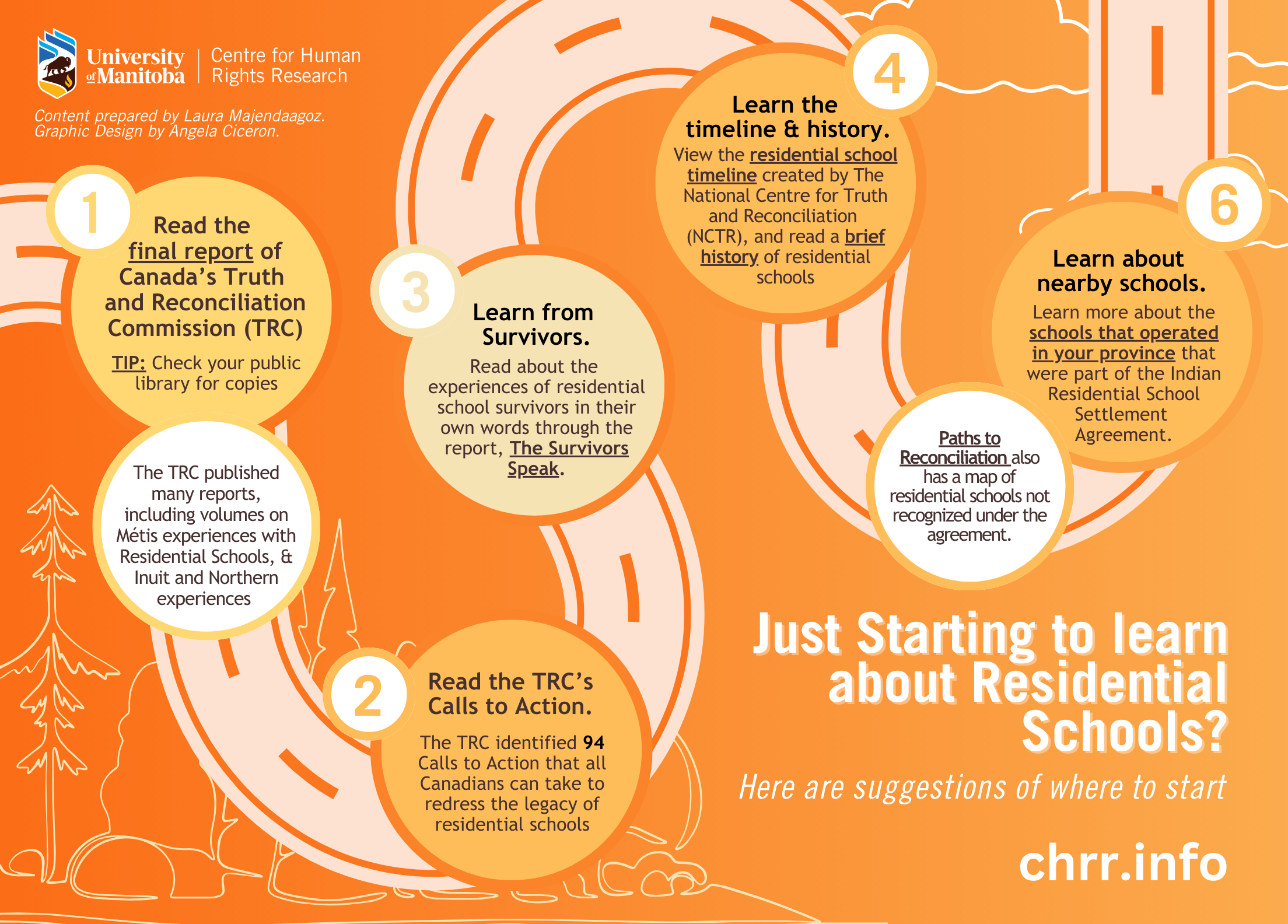
In honour of National Day for Truth and Reconciliation 2024, the CHRR has created an infographic from the resource guide, Doing the Work: What Settlers need to know about the Residential School System. This infographic is meant to guide those seeking to learn more about the residential schooling system through a step-by-step approach to navigating key documents from the Truth and Reconciliation Commission and the National Centre for Truth and Reconciliation.
Doing the Work: What Settlers need to know about the Residential School System is a resource guide developed by the panel from “Doing the Work: A virtual Q & A on what settlers need to know about the residential school system in Canada”, an event hosted by CHRR on Thursday, August 12th 2021. The resource guide was updated in August 2023.

“Dancing with fire in limbo”: The consequences of Myanmar migrants’ ambiguous legal status in Thailand
"Dancing with fire in limbo": The consequences of Myanmar migrants' ambiguous legal status in Thailand
May 20, 2024
Dr. Sai Kyi Zin Soe
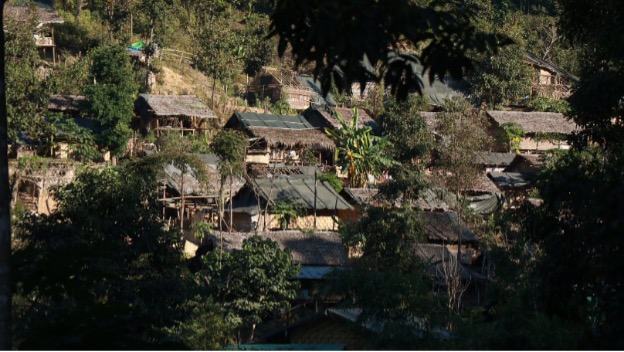
The Department of Anthropology and the Centre for Human Rights Research hosted a lecture with Dr. Sai Kyi Zin Soe on May 30, 2024. Dr. Soe’s presentation “”Dancing with fire in limbo”: The consequences of Myanmar migrants’ ambiguous legal status in Thailand” explores the challenges faced by Burmese refugees in Thailand, who navigate the precarious circumstances of displacement and legal ambiguity. Drawing on social science research, it examines the drivers of forced migration from Myanmar, including the intensified civil war, persecution of ethnic minorities, and economic hardship. In Thailand, these refugees are officially classified as “illegal migrants,” leaving them in a state of limbo without access to essential services and vulnerable to arrest and deportation. Simultaneously, Burmese nationals face pressure to conform to their communities’ expectations regarding political activism and in-country revolution. The presentation emphasizes the importance of understanding these complex realities through a social science lens to inform holistic, rights -based approaches to development policy and practice. By advocating for legal recognition, refugee empowerment, and research-informed strategies, this presentation highlights the transformative potential of social science in shaping policies that bridge the gap between displacement and belonging, positioning refugees as agents of change.
Dr. Sai Kyi Zin Soe is a Research Affiliate at the Centre for Disability Research and Policy, Faculty of Medicine and Health at the University of Sydney. Currently, he serves as a Senior Consultant at the Foundation for Education and Development (FED), dedicated to assisting Myanmar migrants in Thailand. Additionally, he provides support to the Karenni State Interim Parliament (KSIP) in the capacity of a Technical Advisor.

Period Poverty and Equity, On Campus and Beyond Infographic
Period Poverty and Equity, On Campus and Beyond Infographic
August 2, 2024
Graphic Design: Angela Ciceron

In 2023, with funding from the Centre for Human Rights Research (CHRR), the Faculty of Arts, and the University of Manitoba’s Strategic Initiatives Support Fund, a group of researchers affiliated with the CHRR came together to explore and address menstrual equity on campus. The “Period Poverty and Equity, On Campus and Beyond” project undertook a campus audit of washrooms to assess availability of menstrual supplies; a survey open to UM students, staff, and faculty; as well as a number of outreach events.
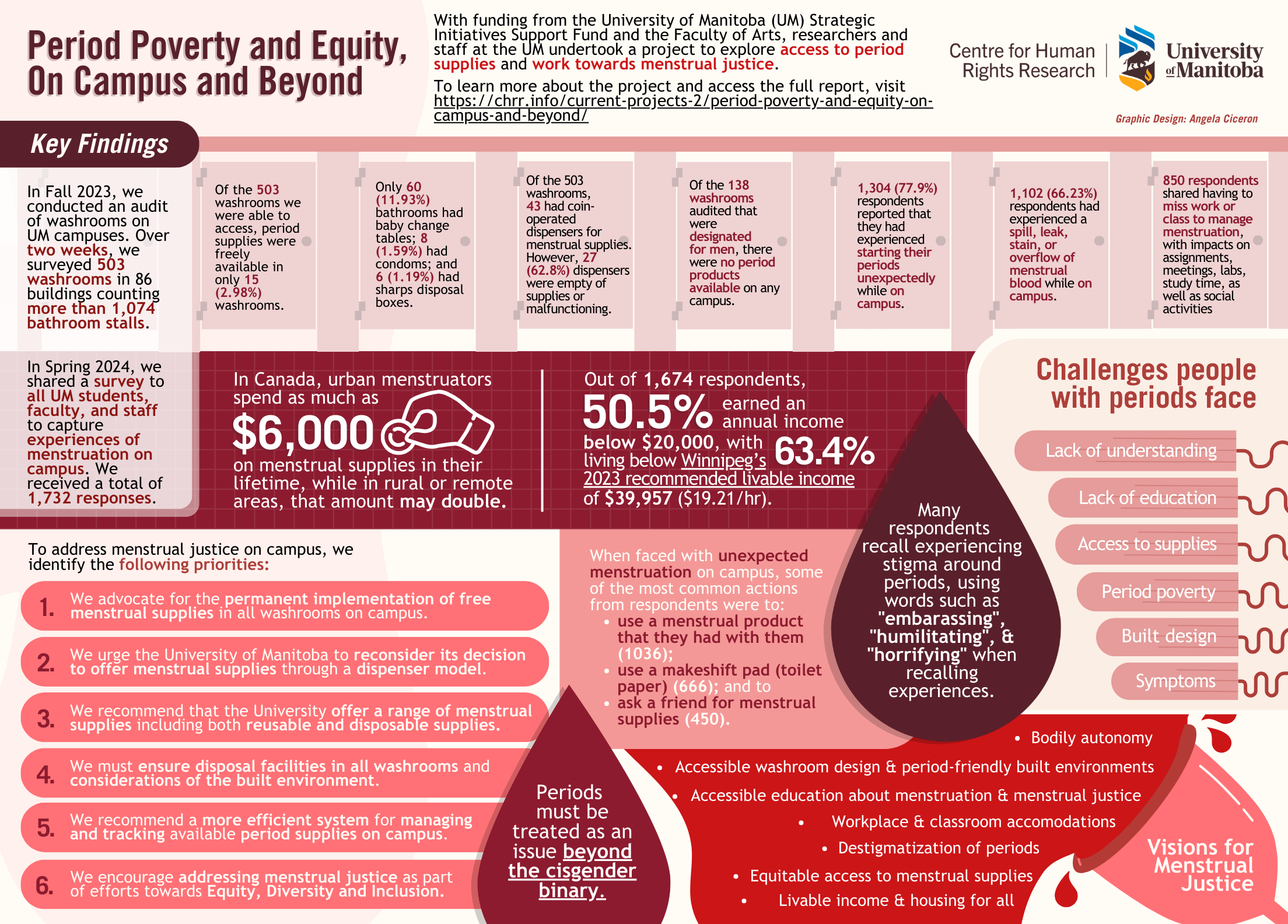
Working towards period equity is not as a charitable endeavour to be ameliorated by donations of period supplies; rather menstrual equity is an issue of justice. Shifting the conversation from period poverty to menstrual justice means asking that all people who menstruate be provided with the resources, tools, and infrastructure to do so with safety and dignity.
Related Resources
Support Us
Whether you are passionate about interdisciplinary human rights research, social justice programming, or student training and mentorship, the University of Manitoba offers opportunities to support the opportunities most important to you.
Executive Summary: Period Poverty and Equity, On Campus and Beyond
Executive Summary: Period Poverty and Equity, On Campus and Beyond
2024
Pauline Tennent et al.

In 2023, with funding from the Centre for Human Rights Research (CHRR), the Faculty of Arts, and the University of Manitoba’s Strategic Initiatives Support Fund, a group of researchers affiliated with the CHRR came together to explore and address menstrual equity on campus. The “Period Poverty and Equity, On Campus and Beyond” project undertook a campus audit of washrooms to assess availability of menstrual supplies; a survey open to UM students, staff, and faculty; as well as a number of outreach events.
Working towards period equity is not as a charitable endeavour to be ameliorated by donations of period supplies; rather menstrual equity is an issue of justice. Shifting the conversation from period poverty to menstrual justice means asking that all people who menstruate be provided with the resources, tools, and infrastructure to do so with safety and dignity.

New project at the CHRR: “Just Waters”
New project at the CHRR: "Just Waters"
July 2, 2024
Pauline Tennent

Just Waters: Thinking with Hydro-Social Relations for a More Just and Sustainable World is an interdisciplinary research project that is housed at the Centre for Human Rights Research at the University of Manitoba. This three-year project, funded by the UM IGNITE Program, will nurture new and ongoing relationships to mobilize and connect individuals locally and internationally to better address the ongoing issues surrounding water justice.
Just Waters is led by Dr. Adele Perry, Distinguished Professor in the Faculty of Arts & Director of the CHRR at the University of Manitoba. Just Waters will apply an interdisciplinary lens to water (in)justice and work to move research to the next steps. By establishing an interdisciplinary approach and centering the hydro-social, the project will nurture new and ongoing relationships to mobilize and connect individuals locally and internationally to better address the ongoing issues surrounding water justice.
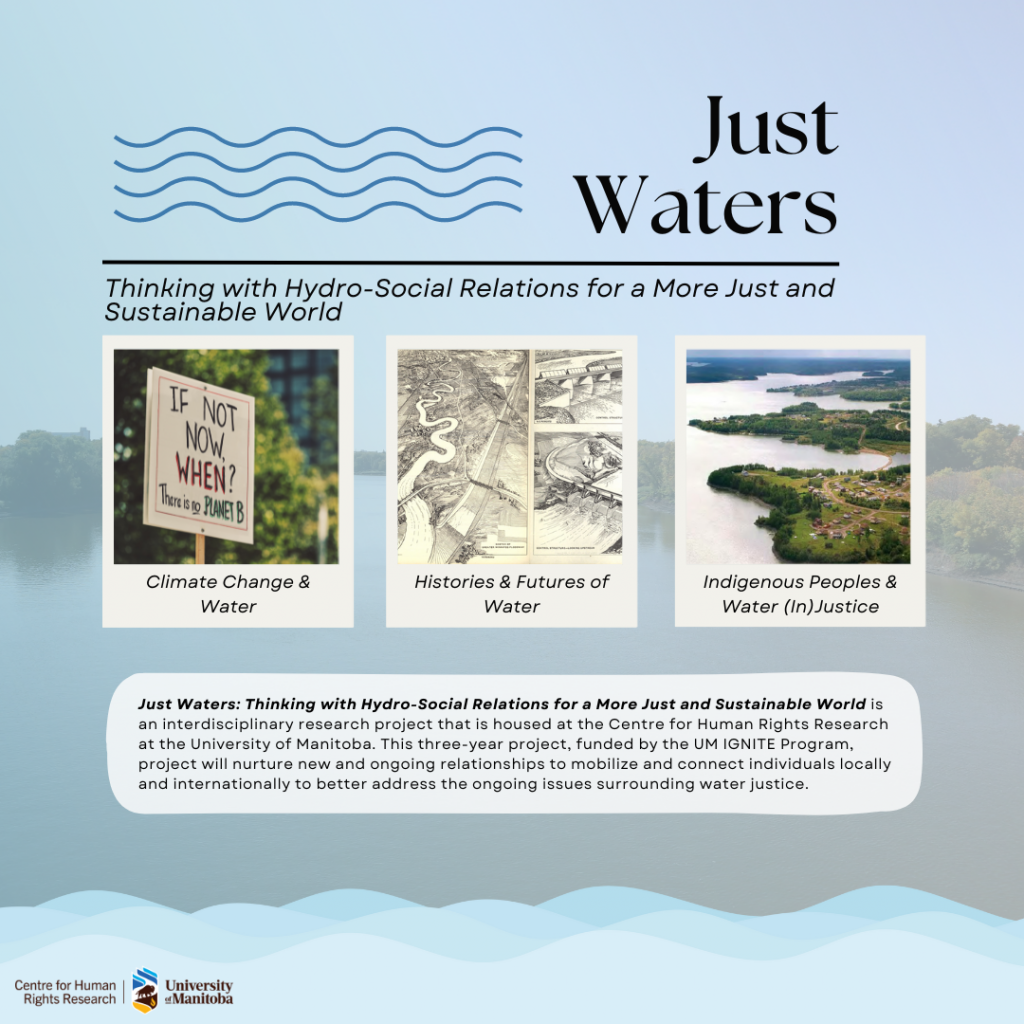
Just Waters will provide and support relevant, original, and timely responses through three overlapping and interrelated clusters: climate change and water; histories and futures of water; and Indigenous peoples and water (in)justice. These clusters will draw on wide interdisciplinary and interfaculty expertise to shed light on the relationship between water, water injustice, and water justice. For more information, check out the project’s webpage.

“No One is Disposable” with Mostafa Henaway
"No One is Disposable" with Mostafa Henaway
March 2024
Mostafa Henaway
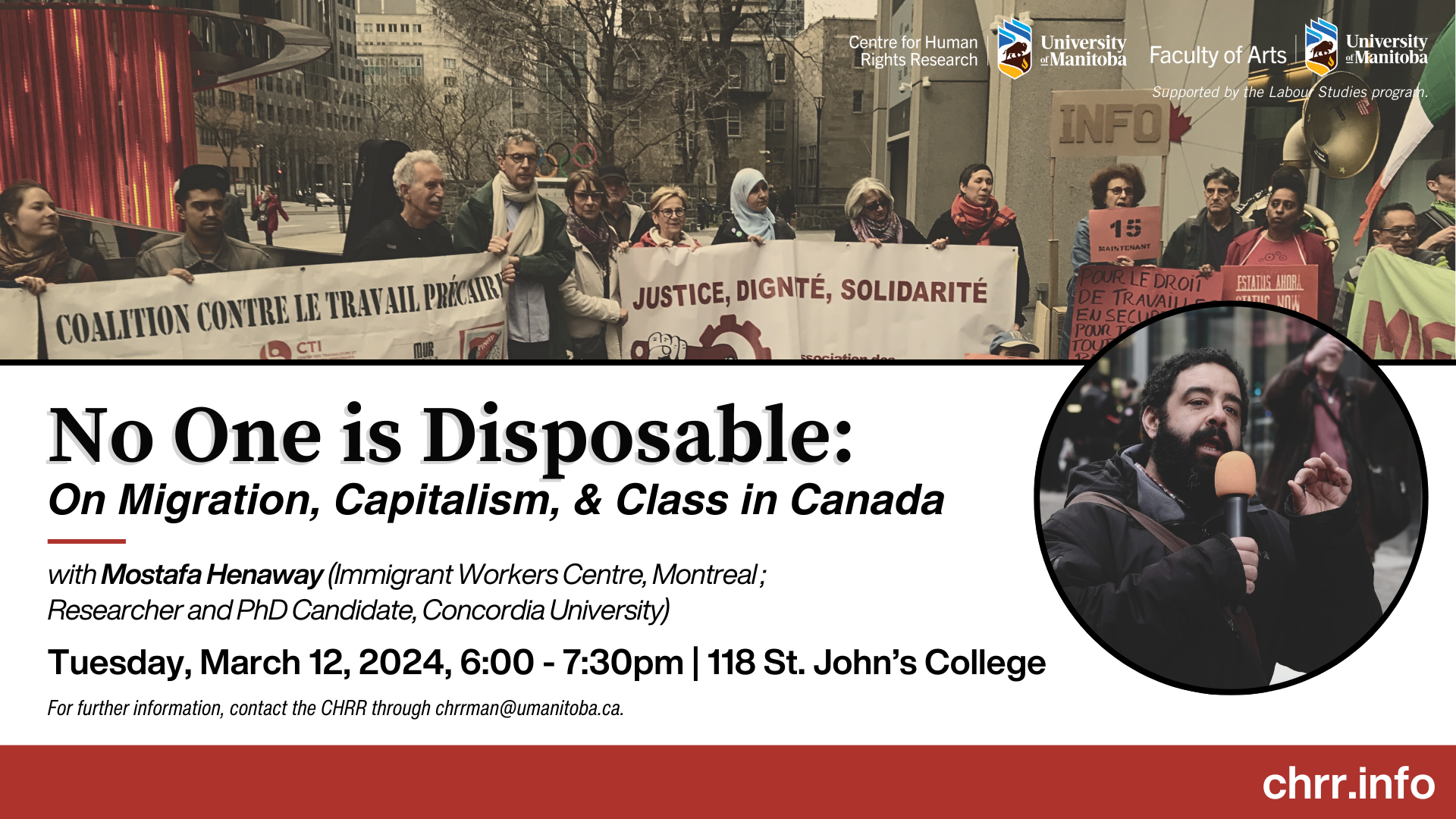
The Centre for Human Rights Research (CHRR) and the Faculty of Arts at the University of Manitoba, hosted Mostafa Henaway (Immigrant Workers Centre – Montreal) for a lecture titled “No One is Disposable: On Migration, Capitalism, and Class in Canada” on March 12, 2024 at the University of Manitoba.
Henaway, a Canadian-born Egyptian, is a long-time community organizer at the Immigrant Workers Centre in Montreal, where he has been organizing for justice for immigrant/migrant workers for over two decades. He is also a researcher and PhD candidate at Concordia University. In his new book, Essential Work, Disposable Workers: Migration, Capitalism and Class, he examines “the massive expansion of precarious work under neoliberalism and how migrant workers are challenging the conditions of their hyper-exploitation through struggles for worker rights and justice.”
Related Resources
Support Us
Whether you are passionate about interdisciplinary human rights research, social justice programming, or student training and mentorship, the University of Manitoba offers opportunities to support the opportunities most important to you.
A Report on Period Poverty and Equity, On Campus and Beyond
A Report on Period Poverty and Equity, On Campus and Beyond
June 2024
Pauline Tennent, et al.
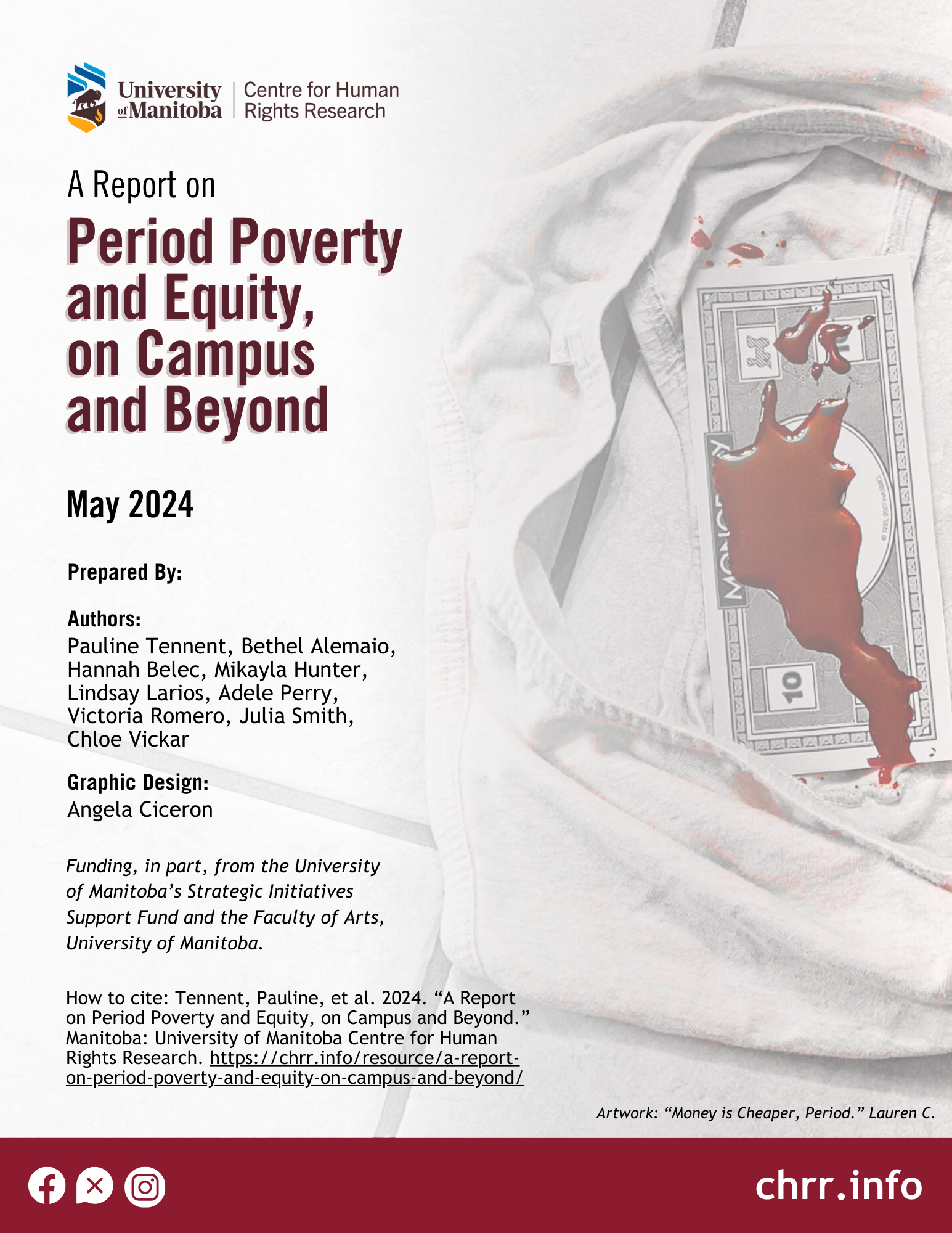
In 2023, with funding from the Centre for Human Rights Research (CHRR), the Faculty of Arts, and the University of Manitoba’s Strategic Initiatives Support Fund, a group of researchers affiliated with the CHRR came together to explore and address menstrual equity on campus. The “Period Poverty and Equity, On Campus and Beyond” project undertook a campus audit of washrooms to assess availability of menstrual supplies, a survey open to UM students, staff, and faculty, as well as a number of outreach events.
Working towards period equity is not as a charitable endeavour to be ameliorated by donations of period supplies; rather menstrual equity is an issue of justice. Shifting the conversation from period poverty to menstrual justice means asking that all people who menstruate be provided with the resources, tools, and infrastructure to do so with safety and dignity.
Related Resources
Support Us
Whether you are passionate about interdisciplinary human rights research, social justice programming, or student training and mentorship, the University of Manitoba offers opportunities to support the opportunities most important to you.
Solidarities + Connections with Palestine: A Podcast
Solidarities + Connections with Palestine: A Podcast
June 6, 2024
Centre for Human Rights Research
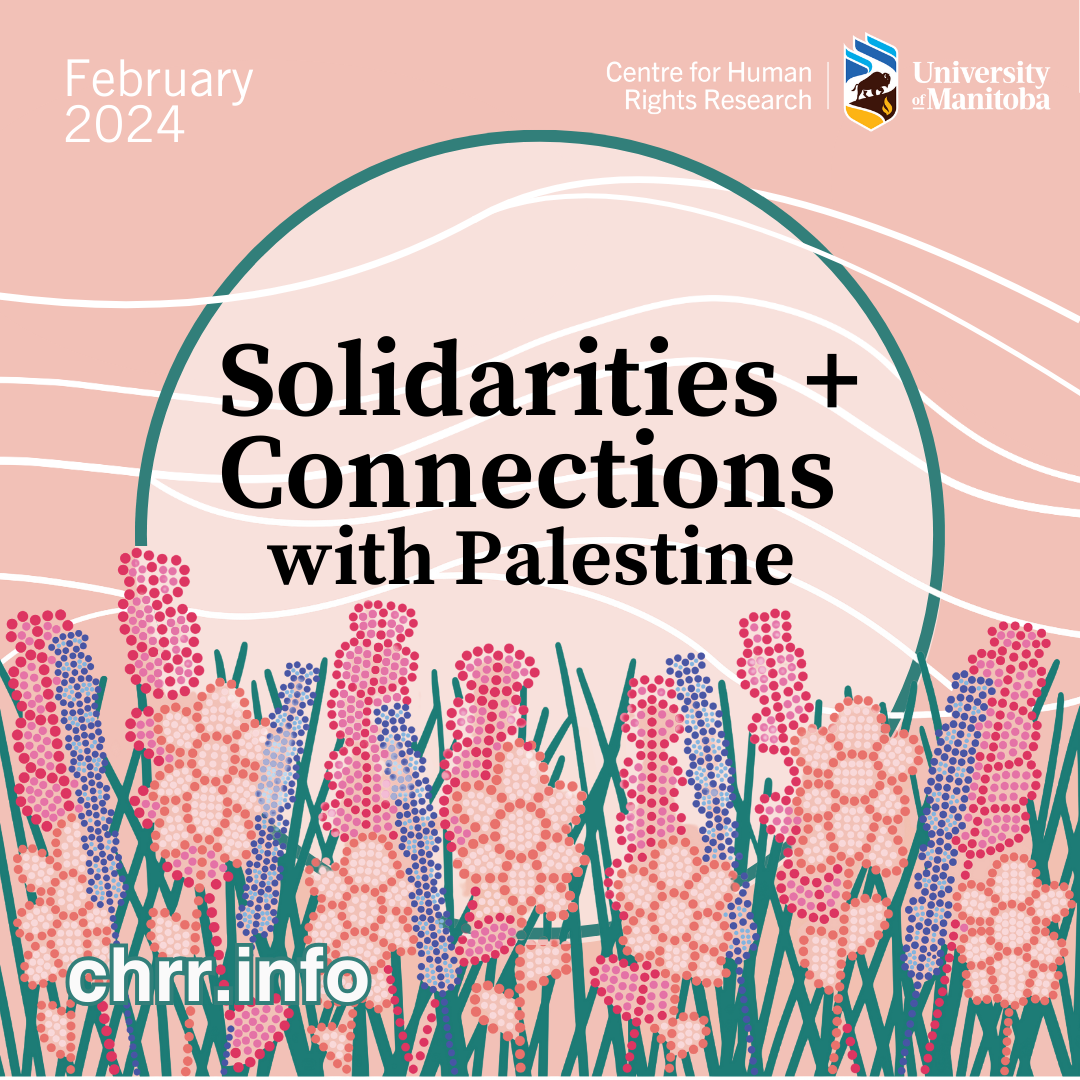
Since the Nakba in 1948, countless Palestinians have been permanently displaced from their country due to the establishment of the state of Israel on Palestinian land. As of May 29, 2024, 36,171 Palestinians have been killed since October 2023 due to the genocide in Gaza, with approximately 1.7 million people being displaced (UN OCHA).
On February 28, 2024, the Centre for Human Rights Research held a virtual panel on Solidarities and Connections with Palestine . The panel sought to identify and develop connections between Treaty 1 and Palestine and we were honoured to host Winnipeg Centre MP Leah Gazan, Independent Jewish Voices Harold Shuster, University of Ottawa’s Alex Neve, and University of Toronto’s Youcef Soufi. Ethel Tungohan also joined the conversation. This conversation reminded us that is a crucial time for individuals, communities, and institutions to stand firmly for human rights — including the rights of people to live free of the human rights violations and international crime that have marked decades of occupation and violence in Israel and Palestine. Our latest podcast is drawn from the conversations from this webinar. Access the podcast at Spotify, Amazon Music, or iHeart Radio.
Artwork: “Wāpikwanīya (Flowers)” by Carly Morrisseau

Contact Us
We’d love to hear from you.
442 Robson Hall
University of Manitoba
Winnipeg, Manitoba
R3T 2N2 Canada
204-474-6453
Quick Links
Subscribe to our mailing list for periodic updates from the Centre for Human Rights Research, including human rights events listings and employment opportunities (Manitoba based and virtual).
Land Acknowledgement
The University of Manitoba campuses are located on original lands of Anishinaabeg, Ininew, Anisininew, Dakota and Dene peoples, and on the National Homeland of the Red River Métis.
Centre for Human Rights Research 2023© · Privacy Policy

